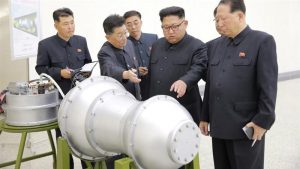North Korea has confirmed its sixth nuclear test after reports of tremors shaking the country.
The official Korean Central News Agency (KCNA) said the hydrogen bomb test on Sunday morning, ordered by leader Kim Jong-un, was a “perfect success”.
The trial at 12pm (03:30 GMT) was carried out to “examine and confirm the accuracy and credibility” of North Korea’s technology, KCNA said.
The news agency hailed the bomb’s “unprecedently large power”, saying it “marked a very significant occasion in attaining the final goal of completing the state nuclear force”.
Pyongyang earlier on Sunday reported details of its latest weapon, claiming it has developed a more advanced nuclear bomb that can be loaded onto a intercontinental ballistic missile (ICBM).
KCNA released undated photographs of Kim inspecting the weapon.
The hydrogen bomb’s power is adjustable to hundreds of kilotons and can be detonated at high altitudes, with its indigenously produced components allowing the country to build as many nuclear weapons as it wants, KCNA said.
Pyongyang started nuclear blast experiments in 2006.
TIMELINE: North Korea’s nuclear tests
The latest test took place in breach of UN sanctions and further increased tensions between Pyongyang and the United States and its allies.
There was no independent confirmation that the detonation was a hydrogen bomb.
It was Pyongyang’s first nuclear test since US President Donald Trump took office, and marked a direct challenge to Trump, who hours earlier had talked by phone with Japanese Prime Minister Shinzo Abe about the “escalating” nuclear crisis in the region.
South Korean President Moon Jae-in called for the “strongest” response and further steps to isolate North Korea, including new UN Security Council sanctions, according to Yonhap state news agency.
China, North Korea’s main ally and economic supporter, strongly condemned the test.
Pyongyang “has ignored the international community’s widespread opposition, again carrying out a nuclear test. China’s government expresses resolute opposition and strong condemnation toward this”, the foreign ministry said in a statement on its website.
China’s Nuclear Safety Administration said it had begun emergency monitoring for radiation along the border after the test.
Russia, meanwhile, called for calm as it criticised Pyongyang.
“In the unfolding conditions, it is imperative to remain calm and to refrain from any actions that lead to a further escalation of tension,” a foreign ministry statement said.
‘Most powerful test yet’
The International Atomic Energy Agency, the UN’s atomic watchdog, also condemned the test as “an extremely regrettable act”.
Japan was the first country to confirm the North Korean nuclear test, while South Korea described the “artificial quake” as “the most powerful” test yet.
Al Jazeera’s Scott Heidler, reporting from Tokyo, said Japanese officials held a national security emergency meeting and have registered an official protest with the North Korean embassy in Beijing.
“Out of today’s meeting, [Japanese officials] called the test ‘a new threat’,” said Heidler. “They said they want to work with the United States and South Korea in convening a UN Security Council meeting, where they would like to pursue a new sanctions resolution.
The US Geological Survey was first to report an earthquake in North Korea on Sunday, citing a first tremor of 6.3 magnitude with a depth of 23 kilometres.
China later said it had also detected a second quake in North Korea of magnitude 4.6, which came eight minutes after the initial tremor.
The tremor was felt as far away as the Chinese city of Changchun around 400km northwest of the North’s test site at Punggye-ri, according to state broadcaster CCTV.
Ross Feingold, a Taiwan-based Asia political analyst, told Al Jazeera that the development of North Korean weapons has been advancing steadily.
“There has clearly been a pace of technological improvement over a period of time, whether it is with nuclear bombs themselves or with the missile delivery technlogy,” he said. “The North Koreans … probabaly have better technological capabilty than a lot of the analysts had given them credit for in the past. And more significantly, they do learn from mistakes.”
Al Jazeera and news agencies

